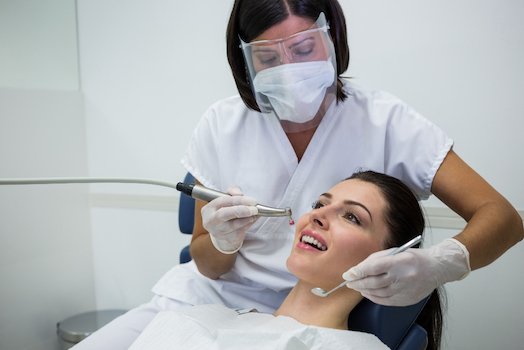Oral Surgery
What is Oral Surgery & When Do You Need it?

Oral Surgery Albury
Oral surgery focuses on the diagnosis and surgical treatment of diseases, injuries, and defects of both the hard and soft tissues of the mouth and teeth.
Surgical procedures in our clinics are conducted in a safe and sterile environment and performed by a team of highly qualified, trained, and experienced oral surgeons.
Common Oral Surgery Procedures
Tooth extraction
Tooth extraction is a simple procedure involving the removal of teeth from the socket in the alveolar bone. The procedure is relatively straightforward and can be quickly performed using local anaesthesia. There are a number of reasons why the extraction of a tooth may be needed.
Impacted teeth removal
If teeth don’t erupt from the gums like they’re supposed to, they can cause problems such as crowding, infection or diseased tissue. However, this can be fixed with a tooth extraction. Your Albury dentist will monitor your mouth and recommend if any misaligned or crowded teeth should be removed to preserve the full integrity of your mouth.
Wisdom teeth removal
Wisdom teeth, or third molars, are very commonly removed because many jaws are not large enough to accommodate them. If they don’t grow properly, they can cause infections, swelling, and shifting of other teeth.
Dental Implants
Dental implants are an option for treating missing teeth. During a dental implant procedure, small screw-like posts are placed in the tooth sockets and allowed to heal. Next, replacement teeth are screwed onto these posts, resulting in permanent replacements that look and feel like natural teeth.
Bone Grafting
Bone grafting is performed when a person does not have sufficient jawbone tissue. This can be the result of failing to replace a missing tooth or a condition that deteriorates the jawbone tissues. Bone grafting is also performed when a patient opts for dental implants but lacks the bone tissue needed to hold the oral prosthetic in place.
What to Expect

The instructions for each type of surgical procedure are different.
General preparation instructions include:
- Not eating for at least a few hours before the procedure
- Avoiding tobacco products and alcohol consumption
- Arranging transportation to and from the clinic
- Planning ahead to avoid strenuous activity during recovery
Your recovery is of critical importance to the outcomes you and your dentist have discussed. Don’t smoke or drink alcohol afterwards — they can slow your healing process.
If you’re in any pain from swelling, use an ice pack to reduce inflammation.
Instead of brushing your teeth, rinse your mouth with salt water every few hours to kill off any bacteria.
Depending on the type of oral surgery you’ve undergone, recovery can range from 48 hours to 1 month. Make sure you follow up with your Albury dentist as directed.
Oral Surgery in Albury
If you believe you’re in need of some type of oral surgery procedure, contact us today and schedule an appointment.
Call us on (02) 6021 4171. Request your appointment online.
We are located at 525 Wilson St in Albury.
Frequently Asked Questions
How long does an oral surgery procedure last?
Do I need local or IV sedation?
How long is recovery?
While modern advances in surgical techniques have led to shorter recovery times, your rate of healing will depend on several factors, such as:
- The actual procedure performed
- Your overall state of health
- How well you follow aftercare instructions.
- Whether or not you are a smoker. Smoking adversely impacts recovery time.
